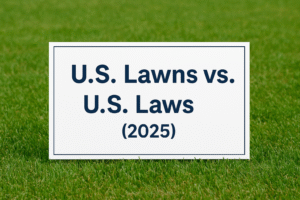
🌿 Introduction
A well-manicured lawn is more than just a symbol of suburban pride—it can also be a legal obligation. In 2025, the relationship between U.S. lawns and regulations has grown more complex due to evolving property regulations, environmental codes, and local ordinances. From grass height requirements to homeowner association (HOA) enforcement and sustainable landscaping laws, American property owners must navigate a variety of legal expectations.
Last Updated: June 23, 2025
Author: Nahyan | UsLawGuide.net
🔍 The Legal Landscape of Lawn Maintenance
Lawn care falls under a combination of
- Local ordinances (city or county-level grass height laws)
- HOA bylaws (in communities with associations)
- State and environmental regulations (especially regarding water usage and fertilizers)
Failure to comply with these rules can result in fines, liens, or court orders.
✔ Grass Height Laws (2025)
Many municipalities require grass to be cut below a certain height, often 6-12 inches. For example:
- Dallas, TX: Maximum grass height is 12 inches
- Orlando, FL: 10 inches before a citation
- Chicago, IL: 8 inches max
These rules aim to reduce fire hazards, pests, and neighborhood disputes. Violations often result in:
- Warning notice
- Grace period (usually 7–10 days)
- Municipal mowing and billing
- Civil fines or property liens for unpaid costs
🛋 Homeowners Associations (HOAs) and Lawn Rules
If you live in an HOA-governed neighborhood, lawn laws can be even stricter. Common HOA rules include
- No brown patches or weeds
- Required watering during dry months
- Specific mowing schedules
- Banned grass types or landscaping features
Violating HOA rules may result in:
- Monthly fines
- Legal action for non-compliance
- Restricted access to community amenities
Legal Protection:
Homeowners do have rights:
- Right to challenge HOA actions (in small claims or civil court)
- State laws governing HOA limits vary. For example:
- California’s Davis-Stirling Act
- Texas Property Code Chapter 209
🌿 Water Restrictions and Fertilizer Laws
As water conservation becomes more urgent, states like California, Arizona, and Nevada have implemented strict outdoor water usage rules.
Lawn care may be regulated by:
- Watering schedules (e.g., no watering on certain days)
- Prohibited sprinkler use during daytime hours
- Fines for runoff or excessive use
- Fertilizer bans during rainy seasons (to prevent groundwater contamination)
These are enforced by both municipal code enforcement and environmental regulators.
🏠 Property Rights and Lawn Disputes
Lawns can also become legal battlegrounds between neighbors. Common issues:
- Encroachment: Roots, branches, or sprinkler systems crossing property lines
- Overgrowth complaints: Tall grass affecting neighbor property value
- Shared fences or lawn borders
Legal Remedies:
- Small claims court for property damage
- Mediation required by some local jurisdictions
- Tree and shrub laws (in many states, e.g., CA and NY) determine trimming responsibilities
📌 Sustainable Lawns & Legal Incentives
In 2025, many cities now incentivize eco-friendly lawns with legal and financial benefits:
- Cash rebates for xeriscaping (e.g., Las Vegas Water Authority)
- Native plant allowances to override HOA bans (e.g., Florida-friendly landscaping law)
- Rainwater collection systems legally protected in states like Colorado and Oregon
These programs aim to balance aesthetic norms with climate-conscious landscaping.
❓ FAQ Section
Q: Can I be fined for not mowing my lawn in the U.S.?
➡ Yes. Many cities have ordinances with specific grass height limits. Fines vary by location.
Q: What if my HOA says I can’t plant native grass or install rock landscaping?
➡ Check state law. In some states, like Florida and California, homeowners can override HOA bans with environmental exceptions.
Q: Can I sue my neighbor over an overgrown lawn?
➡ Possibly, if it affects property value or causes health/safety hazards. Most cases begin in small claims court or through city code enforcement.
⚠️ Disclaimer
This article is for informational purposes only. Lawn care laws vary significantly by state, city, and HOA. Always check local ordinances or consult a legal professional before taking legal action.
🔗 Internal & External Links
External:
- https://www.epa.gov/environmental-topics/lawns-and-landscaping
- https://www.nolo.com/legal-encyclopedia/landscaping-and-law.html
Internal (uslawguide.net):